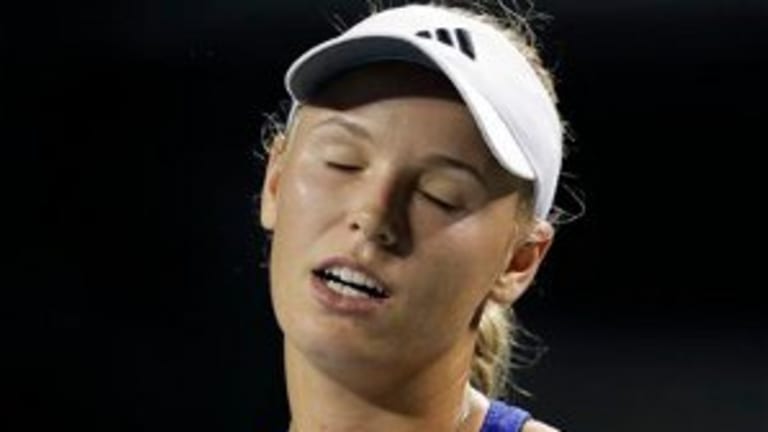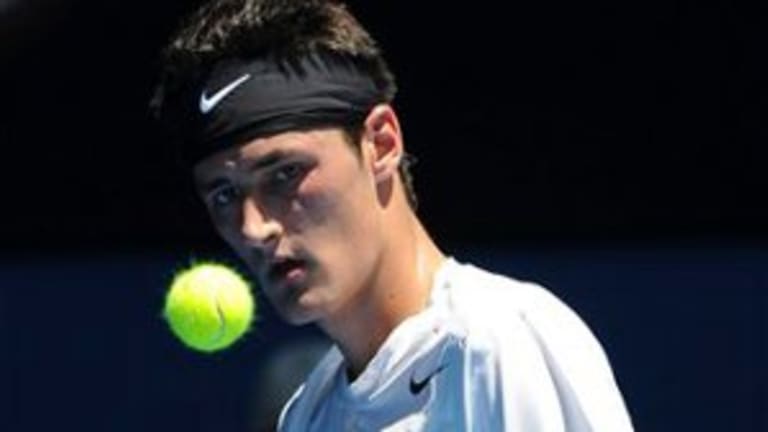Peter Bodo continues his year-end awards—12 in all, for 2012—with the year's Biggest Disappointments. You can see rest of his selections as well as the upcoming awards at the end of this article.
12 for '12: Biggest Disappointments
By Peter Bodo Dec 06, 2012Pick of the Day
Rafael Nadal vs. Jiri Lehecka, Mutua Madrid Open
By Zachary Cohen Apr 30, 2024Madrid, Spain
Aryna Sabalenka snaps Danielle Collins' 15-match win streak in Madrid comeback effort
By TENNIS.com Apr 29, 2024Social
Pedro Cachin asks Rafael Nadal for his shirt after Madrid defeat: "Dream come true"
By Baseline Staff Apr 29, 2024Madrid, Spain
Jannik Sinner saves set point, beats Pavel Kotov in Madrid third-round test
By TENNIS.com Apr 29, 2024Nadal tested in 3-hour win over Cachin in Madrid and Swiatek reaches women's quarters
By Associated Press Apr 29, 2024Madrid, Spain
Rafael Nadal wins in Madrid, defeats Pedro Cachin to reach fourth round
By David Kane Apr 29, 2024Madrid, Spain
Living spaces: Daniil Medvedev adapting to Madrid's condensed courts
By TENNIS.com Apr 29, 2024Ranking Reaction
Jessica Pegula is spending her milestone 100th straight week in the Top 10
By John Berkok Apr 29, 2024Social
Jannik Sinner's Carota Boys fan club reveal their favorite things about him
By Baseline Staff Apr 29, 2024Advertising

12 for '12: Biggest Disappointments
Women’s: Caroline Wozniacki
Although Wozniacki never has won a Grand Slam title, you would expect that the pride she took from finishing as the year-end No. 1 for two consecutive years would have impelled her to do something—anything—in 2012 to declare that she’s not giving up her privileged place in the game. You know, trip Serena Williams on a changeover. Throw a cream pie into Agnieszka Radwanska’s face. Beat someone besides that other Slam-less former No. 1, Jelena Jankovic (against whom Wozniacki was 2-0 in 2012).
But no, Wozniacki did nothing of the kind. Instead, she continued to cultivate and trade on her image as a fun-loving, easygoing, coach-firing, golfer-dating, publicity-seeking young lady of 22. She seems blithely unconcerned—or is it “unaware?”—that the game may be passing her by. But that’s a mistake made easily enough when you consider how hard the WTA (as well as Wozniacki and her handlers) have worked to position her, and others like her, as glamorous celebrities who are far too special to be perceived as mere athletes, or judged on something as simple as their results.
Perhaps Wozniacki really does care, in the sense that a Rafael Nadal or a Serena or a Maria Sharapova really cares, about winning big tournaments. But the signal she sends in word and deed is that while it would be nice to do that, it isn’t necessarily worth getting all worked up over.
The same goes for coaching. It’s nice to have a coach, especially when you’ve come up against some hard realities that have put a cap on your up-side. In Wozniacki’s case, those were bundled under the fact that in today’s game, you can’t win a Grand Slam title just by playing excellent defense, not with ball strikers like Serena, Sharapova, and Victoria Azarenka afoot.
But then, if you let your father continue to feed the balls, you can stay in your comfort zone and also save a lot of money. Hence the quick end to the Ricardo Sanchez experiment and the immediate reinstatement of Wozniacki’s father, Piotr, as coach. Looking at it that way makes it easier to understand why Wozniacki blind-sided Sanchez by firing him in Februrary, just two months after taking him on as a coach. The poor guy barely had time to tell the world what a thrill and honor it was to get the job—and he was out the door.
Ironically, Sanchez was the coach-of-record for Wozniacki’s best Grand Slam result this year, a quarterfinal at the Australian Open (where she lost to Kim Clijsters). But it was all downhill from there: A third-round appearance at the French Open, and successive first-round losses at the final two majors of the year.
Wozniacki’s record for 2012 was a mediocre—certainly for her—50-21, and with a few exceptions her year was downright lousy until the late fall. In order to finish in the Top 10, Wozniacki had to win Moscow (only her second title of the year) and make the final of Sofia, the second-tier version of the WTA Championships, called the “Tournament of Champions” but more aptly described as the semi-invitational “Tournament of Also-Rans.”
Wozniacki’s 7-5 in-the-third win over Sam Stosur in the Moscow final was a praiseworthy accomplishment, one of the few from her year. But her loss to Nadia Petrova in the Sofia final by a dismal 6-2, 6-1 score was more emblematic of her season.
Some would say that given her natural limitations and inclinations as a conservative, defensive baseliner, Wozniacki is doing just great. She ought to be praised instead of criticized for her consistency. There’s some truth to that; Wozniacki certainly earned that No. 1 ranking on the court, and even in this disappointing year she finished in the elite Top 10. But in tennis, we grade on a curve, and those players lucky and gifted enough to stand as Grand Slam title contenders are expected to show strength, determination, and a burning desire to improve and win. Perhaps Wozniacki has been thrown off her game by her well-publicized relationship with golfer Rory McIlroy; it wouldn’t be the first time that romance has proved a deterrent to focus and success (and that’s especially true for younger players).
But until Wozniacki herself addresses that issue, or gives some indication that she’s actually troubled by the fall-off in her results, we can only go by the evidence of our eyes. Right now, they tell us that Wozniacki is loving life, and not overly concerned that she’s has gone from world No. 1 to runner-up in the Tournament of Also-Rans.
Honorable Mention: Svetlana Kuznetsova
The two-time Grand Slam champion and former world No. 3 has always been a moody free-spirit, her ranking given to great fluctuations depending on whether or not she feels like working and playing. Her season was severely impacted by injuries—a right knee injury forced her to give up on the year after a first-round loss at Wimbledon—but she was already out of the Top 30 by then. She’s just 27, but you have to wonder how much of a force she’ll be in the future.
Advertising

12 for '12: Biggest Disappointments
Men’s: Bernard Tomic
It tells you something about the magnitude of Tomic’s problems that out of all the 12 for ‘12 categories, this selection was the quickest and easiest to make. This was a year during which many pundits expected Tomic to build on his 2011 season, where he finished ranked No. 42, partly by virtue of a quarterfinal performance at Wimbledon.
Instead, the 19-year-old (Tomic turned 20 in October) melted down so comprehensively after hitting a career-high ranking of No. 27 last June that some in the Australian tennis establishment fear that he’s spinning out of control and unlikely to be stopped by anything or anyone.
Just yesterday, Tennis Australia’s director Craig Tiley announced that Tomic will not be selected to represent his country in the Aussies’ next Davis Cup tie against Taiwan, and it appears that the organization might also cut off the funding it has continued to provide for the former prodigy.
Tomic’s ongoing off-court problems began early this year, when he had a series of run-ins with the police on Australia Day (among other things, he was illegally driving a powerful BMW M3 car). By the end of June, his tennis also was suffering from SICS, or Self-Important Celebrity Syndrome.
The downhill slide began in earnest at Wimbledon, where wild card David Goffin spotted Tomic a set, then swept away the No. 20 seed in four. In his press conference afterward, Tomic said: “I think the last few months. . .I have sort of slacked off a little bit and look what it’s costing me. It’s just strange. I mean, like on the way up I have been growing up playing and everything’s got easy. I’ve gotten to where I have won very easily. It’s amazing. Now you let the foot off the pedal and it’s costing you. It’s something I’ll learn. . .I’ll wake up and get back to the way I was playing. . .and get back to that training mode to get me to the Top 15, 20 at the end of the year even.”
I guess his intentions were good, and while I’m not privy to the details of his practice and training schedule, it’s obvious that Tomic’s game never really recovered. He lost the next three matches he played (including an Olympic Games defeat to Kei Nishikori), and won just three more matches total heading into the U.S. Open. Tomic won a round at Flushing Meadows, but then seemed to give up in his battle with Andy Roddick—thereby earning the nickname “Tomic the Tank Engine.”
Granted, Roddick had enormous crowd support, thanks partly to having announced that the tournament would be the last of his career. But Tomic’s lack of effort as the three-set blowout progressed (Roddick won 6-3, 6-4, 6-0) was so conspicuous that even his own Davis Cup captain, Pat Rafter, described it as “disgraceful.”
Tomic lost four of the next six tournament matches he played, and pulled the plug on his season after losing in the first round of Basel to Mikhail Youzhny, 6-0, 6-2. Then, just days later while back home, he was involved in a scuffle that ended with a visit by the police to an apartment house on the Gold Coast. Apparently, the altercation was just part of Tomic’s celebration of his 20th birthday, which reportedly went on for days.
Given his youth, there’s still hope for Tomic. But his father, John, is also his coach, and Bernie’s supporters aren’t expecting to get much help from that corner, with that relationship often appearing dysfunctional. During his match with David Ferrer in Miami, Bernard actually tried to get his father removed from the stadium:
Advertising
Tomic clearly needs a wake-up call, but the one he got at Wimbledon only led him to hit the “snooze” button. And since then, it’s only gone from bad to worse.
Honorable Mention: Fernando Verdasco
The world No. 24 is ranked exactly where he was 12 months ago. The big difference is that, in 2011, he was coming off his second straight year-end Top 10 ranking. At the time, it seemed like an understandable off-year for a guy who had experienced a long and not entirely expected period of success after a hard climb. But Verdasco’s continuing inability to recapture his form now makes me wonder if he ever really belonged in that elite second tier.
12 for '12: Year-End Awards
**- Wednesday, November 28: Coaches of the Year
- Thursday, November 29: Doubles Performances of the Year
- Friday, November 30: Tournaments of the Year
- Saturday, December 1: Upsets of the Year
- Sunday, December 2: Quotes of the Year
- Monday, December 3: Feuds of the Year
- Tuesday, December 4: Newcomers of the Year
- Wednesday, December 5: Most Improved Players
- Thursday, December 6: Biggest Disappointments
- Friday, December 7: Comebacks of the Year
- Saturday, December 8: Runner-Ups of the Year
- Sunday, December 9: Stories of the Year**
**Player of the Year, Men: Novak Djokovic
Player of the Year, Women: Serena Williams**